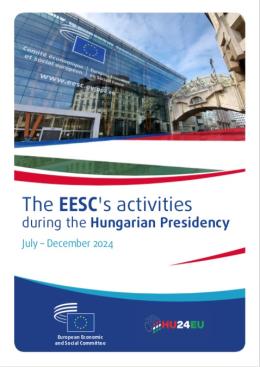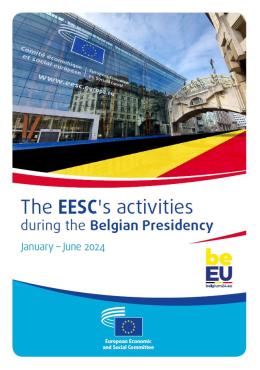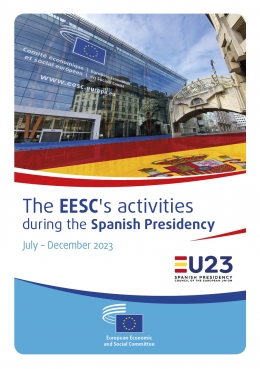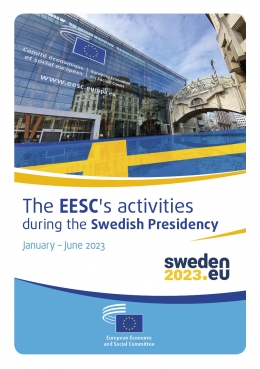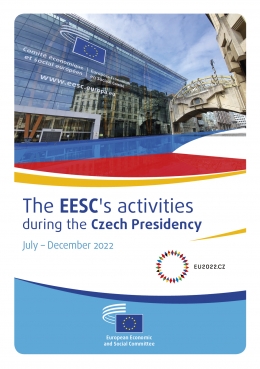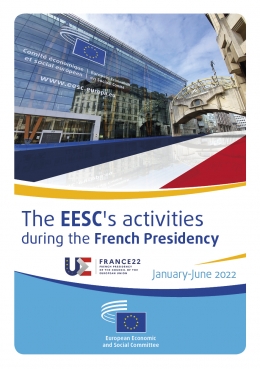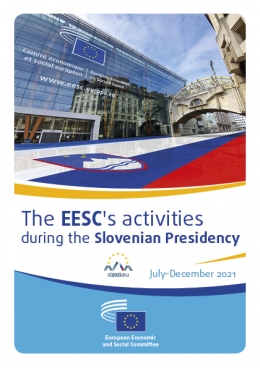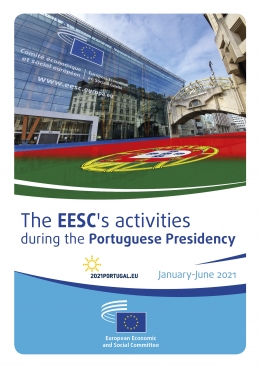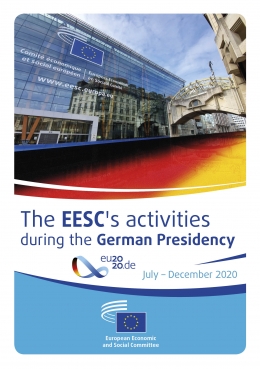European Economic
and Social Committee
Subscribe
Main navigation
-
O Komitecie
ABOUT
The European Economic and Social Committee (EESC) is the voice of organised civil society in Europe.
Find out more about its role and structure at http://www.eesc.europa.eu/en/about
- Struktura polityczna
- Struktura administracyjna
- WSPÓŁPRACA Z INNYMI INSTYTUCJAMI
- Rules
-
Działalność Komitetu
OUR WORK
The EESC issues between 160 and 190 opinions and information reports a year.
It also organises several annual initiatives and events with a focus on civil society and citizens’ participation such as the Civil Society Prize, the Civil Society Days, the Your Europe, Your Say youth plenary and the ECI Day.
Find the latest EESC opinions and publications at http://www.eesc.europa.eu/en/our-work/opinions-information-reports/opinions and http://www.eesc.europa.eu/en/our-work/publications-other-work/publications respectively.
- Opinie i raporty informacyjne
- Dokumenty
- Publikacje i inne prace
-
Społeczeństwo obywatelskie i udział obywateli
- Civil Society Week
- European elections 2024
- Nagroda dla Społeczeństwa Obywatelskiego
- The Conference on the Future of Europe
- Europejski paszport demokracji
- Twoja Europa – Twoje zdanie!
- Europejska inicjatywa obywatelska
- The path to our industrial future
- Youth Climate and Sustainability Round Tables
- EU Organic Awards
- Civil Society Against COVID 19
- EESC stands with Ukraine
- Partnerships
- Relations with ESCs
-
Polityka
POLICIES
The EESC is active in a wide range of areas, from social affairs to economy, energy and sustainability.
Learn more about our policy areas and policy highlights at http://www.eesc.europa.eu/en/policies
-
Obszary polityki
- Rolnictwo, rozwój obszarów wiejskich i rybołówstwo
- Działania w dziedzinie klimatu
- Spójność, polityka regionalna i miejska
- Konsumenci
- Przemiana cyfrowa i społeczeństwo informacyjne
- Unia gospodarcza i walutowa
- Kształcenie i szkolenie
- Zatrudnienie
- Energia
- Przedsiębiorstwa
- Środowisko
- Stosunki zewnętrzne
- Usługi finansowe i rynki kapitałowe
- Prawa podstawowe i obywatelskie
- Housing
- Przemysł i przemiany w przemyśle
- Sprawy instytucjonalne i budżet UE
- Migracja i azyl
- Badania naukowe i innowacje
- Usługi świadczone w interesie ogólnym
- Jednolity rynek
- Sprawy społeczne
- Zrównoważony rozwój
- Opodatkowanie
- Transport
-
W centrum uwagi
- Call to EU candidate countries civil society
- EESC stands with Ukraine
- The Conference on the Future of Europe
- Europejska platforma zainteresowanych stron na rzecz gospodarki o obiegu zamkniętym
- European Gender Equality Week
- COP 29
- Youth participation at the EESC
- EU Blue Deal
- ConnectingEU
- EU Rural Pact
-
Obszary polityki
-
Program
AGENDA
The EESC holds nine plenary sessions per year. It also organises many conferences, public hearings and high-level debates related to its work.
Find out more about our upcoming events at http://www.eesc.europa.eu/en/agenda/our-events/upcoming-events
- Nasze wydarzenia
-
Aktualności i media
NEWS & MEDIA
Here you can find news and information about the EESC'swork, including its social media accounts, the EESC Info newsletter, photo galleries and videos.
Read the latest EESC news http://www.eesc.europa.eu/en/news-media/news and press releases http://www.eesc.europa.eu/en/news-media/press-releases
- President
-
Członkowie i Grupy
MEMBERS & GROUPS
The EESC brings together representatives from all areas of organised civil society, who give their independent advice on EU policies and legislation. The EESC's326 Members are organised into three groups: Employers, Workers and Various Interests.
Find out more about our Members and groups at http://www.eesc.europa.eu/en/members-groups
- Członkowie
- Grupy
-
Sekcje i inne organy
SECTIONS & OTHER BODIES
The EESC has six sections, specialising in concrete topics of relevance to the citizens of the European Union, ranging from social to economic affairs, energy, environment, external relations or the internal market.
Find out more at http://www.eesc.europa.eu/en/sections-other-bodies
-
Sekcje / komisja
- Sekcja ds. Unii Gospodarczej i Walutowej oraz Spójności Gospodarczej i Społecznej (ECO)
- Sekcja Jednolitego Rynku, Produkcji i Konsumpcji (INT)
- Sekcja Transportu, Energii, Infrastruktury i Społeczeństwa Informacyjnego (TEN)
- Sekcja Zatrudnienia, Spraw Społecznych i Obywatelstwa (SOC)
- Sekcja Rolnictwa, Rozwoju Wsi i Środowiska Naturalnego (NAT)
- Sekcja Stosunków Zewnętrznych (REX)
- Komisja Konsultacyjna ds. Przemian w Przemyśle (CCMI)
- Centra monitorowania
- Inne organy
-
Sekcje / komisja
- Ukraine
sidebar submenu
O Komitecie
- Struktura polityczna
- Struktura administracyjna
- WSPÓŁPRACA Z INNYMI INSTYTUCJAMI
- Rules
